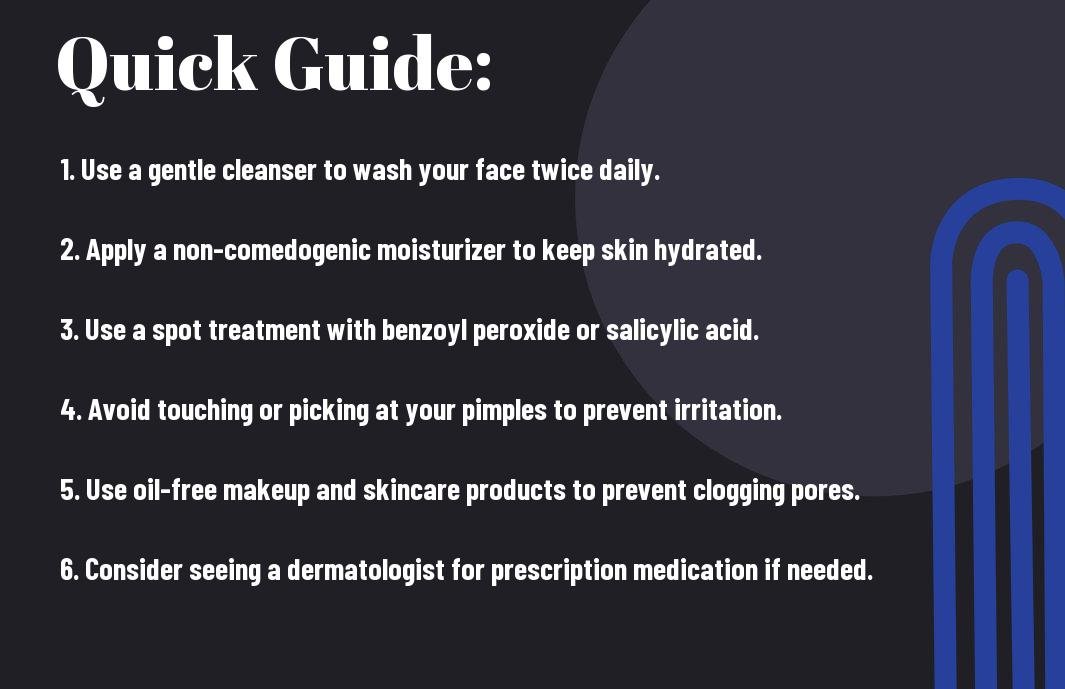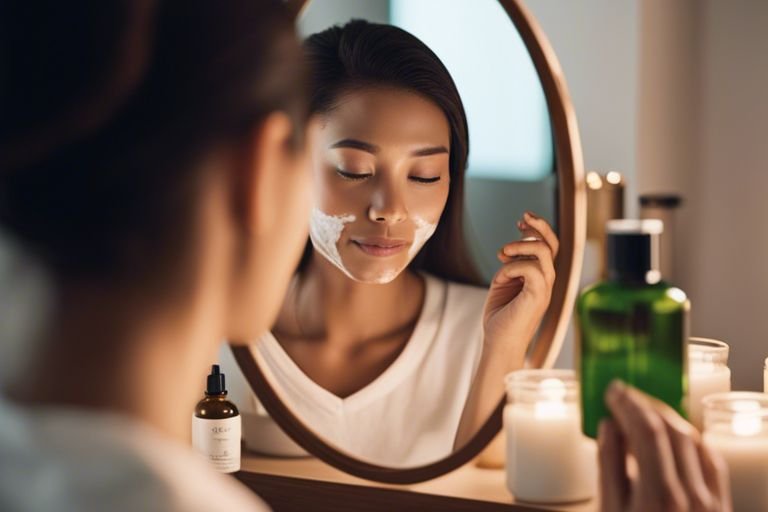Dealing with itchy pimples can be a challenging and frustrating experience, but there are effective strategies to manage and eliminate these pesky blemishes. As someone who has struggled with acne for years, I understand the impact it can have on your self-esteem and overall well-being. In this guide, I will share my top tips and advice for addressing itchy pimples and managing acne symptoms. Itchy pimples can be a sign of inflammation and infection, so it’s important to take action to prevent them from worsening and causing potential scarring. I will cover everything from proper skincare routines to lifestyle changes that can make a significant difference in your skin’s health. Whether you’re dealing with occasional breakouts or chronic acne, I’m here to help you take control of your skin and achieve a clearer, healthier complexion.
Key Takeaways:
- Identify the cause: Understanding the root cause of your itchy pimples is crucial in finding effective treatment options.
- Keep your skin clean: Regularly wash your face with a gentle cleanser to remove excess oil and dirt, which can exacerbate acne symptoms.
- Avoid picking or scratching: Picking or scratching itchy pimples can lead to further irritation and potential scarring.
- Use non-comedogenic products: Look for skincare and cosmetic products that are labeled non-comedogenic to prevent clogged pores and future breakouts.
- Consult a dermatologist: If itchy pimples persist or worsen, seek professional advice from a dermatologist who can provide personalized treatment options.
Types of Itchy Pimples
Before I dive into the ways of managing itchy pimples, it’s important to understand the different types of pimples that can cause itching. Knowing these distinctions can help you identify your symptoms more accurately and choose the most appropriate treatment.
| Pustules | Small, red bumps filled with pus that can be itchy and tender. |
| Papules | Small, raised bumps that may be red and inflamed, often itchy and sensitive to the touch. |
| Nodules | Larger, solid, painful lumps beneath the surface of the skin that can be itchy and require professional treatment. |
| Cysts | Deep, pus-filled pimples that can be extremely itchy, painful, and may lead to scarring if not treated properly. |
Pustules
Pustules are small, red bumps filled with pus that can be itchy and tender. They are usually a result of infected pores and can be aggravated by certain skincare products or makeup. It’s important not to pick or squeeze pustules as this can lead to further infection and scarring. If your pimples are turning into pustules and causing itching, it’s best to consult a dermatologist for appropriate treatment.
Papules
Papules are small, raised bumps that may be red and inflamed, often itchy and sensitive to the touch. They are typically tender to the touch and may appear in clusters. It’s crucial not to scratch papules as this can worsen inflammation and lead to scarring. Topical treatments such as salicylic acid or benzoyl peroxide can help reduce papules and alleviate itching.
Nodules
Nodules are larger, solid, painful lumps beneath the surface of the skin that can be itchy and require professional treatment. They are caused by a buildup of oil and dead skin cells deep within the hair follicles. Nodular acne can be resistant to over-the-counter treatments, so it’s essential to seek help from a dermatologist to prevent scarring and alleviate itching.
Cysts
Cysts are deep, pus-filled pimples that can be extremely itchy, painful, and may lead to scarring if not treated properly. They are often larger than other types of pimples and can be quite sensitive to the touch. Cystic acne requires medical intervention, and a dermatologist can provide the most suitable treatment options to reduce inflammation, prevent scarring, and relieve itching.
Tips for Managing Acne Symptoms
Some tips for managing acne symptoms include maintaining a regular skincare routine, making diet and lifestyle changes, choosing the right products for your skin, and avoiding triggers that can exacerbate acne symptoms.
- Find a gentle cleanser that contains salicylic acid or benzoyl peroxide to use morning and night
- Moisturize with a non-comedogenic product to keep your skin hydrated without clogging pores
- Use oil-free and non-comedogenic makeup to avoid further irritation
- Be wary of touching your face or picking at your pimples to prevent infection and scarring
Perceiving the symptoms of acne and understanding how to manage them can make a significant difference in your overall skin health.
Skincare Routine
Establishing a regular skincare routine is essential for managing acne symptoms. Cleansing your face twice a day, using non-abrasive products, and applying acne medication as directed can help keep your skin clear and healthy.
Diet and Lifestyle Changes
Adjusting your diet and lifestyle can also play a significant role in managing acne symptoms. Eating a balanced diet, staying hydrated, and getting regular exercise can help reduce inflammation and improve overall skin health.
Choosing the Right Products
When it comes to managing acne symptoms, choosing the right products is crucial. Look for labels that indicate non-comedogenic, oil-free, and containing acne-fighting ingredients such as salicylic acid or benzoyl peroxide.
Avoiding Triggers
Identifying and avoiding triggers that exacerbate acne symptoms is essential for managing breakouts. Whether it’s certain foods, stress, or environmental factors, being mindful of what triggers your acne can help you take proactive measures to manage your symptoms.
Step-by-Step Guide to Treating Itchy Pimples
After dealing with itchy pimples for years, I have found an effective step-by-step guide to managing acne symptoms. Below is a breakdown of the treatments and solutions that have worked best for me. Keep in mind that everyone’s skin is different, so it’s important to consult with a dermatologist to determine the best approach for your specific needs.
| Cleansing and Exfoliating | Using Topical Treatments |
| I recommend cleansing the affected area twice a day with a gentle cleanser to remove excess oil, dirt, and bacteria. Exfoliating once or twice a week can help remove dead skin cells and prevent clogged pores. | Topical treatments such as benzoyl peroxide, salicylic acid, or sulfur can help reduce inflammation and kill bacteria. Apply a thin layer to the affected area, following the instructions on the product label. |
Cleansing and Exfoliating
When treating itchy pimples, cleansing the affected area is crucial. I recommend using a gentle cleanser formulated for acne-prone skin to remove excess oil and impurities without over-drying. After cleansing, exfoliating once or twice a week can help remove dead skin cells and prevent clogged pores. Be sure to use a gentle exfoliant to avoid irritating the skin further.
Using Topical Treatments
Topical treatments can be extremely effective in managing itchy pimples. I highly recommend using products containing benzoyl peroxide, salicylic acid, or sulfur to reduce inflammation and kill bacteria. When applying topical treatments, be sure to follow the instructions on the product label and use a thin layer to avoid excessive drying or irritation.
Seeking Professional Help
If over-the-counter treatments are not providing relief, it may be time to seek professional help. A dermatologist can recommend prescription-strength topical treatments or oral medications to target stubborn acne. Additionally, they can provide personalized skincare recommendations based on your specific skin type and concerns.
Managing Scarring and Discoloration
It’s important to address any scarring or discoloration that may result from itchy pimples. I recommend using products with ingredients like retinoids, vitamin C, or niacinamide to help fade dark spots and improve the overall texture of the skin. In severe cases, procedures such as chemical peels or laser therapy may be necessary to effectively manage scarring.
Factors to Consider When Dealing with Itchy Pimples
Unlike regular pimples, itchy pimples can be more than just a nuisance. There are several factors to consider when trying to manage acne symptoms. Here are some important things to think about:
- Skin type: Your skin type can greatly affect how your body responds to acne and itchy pimples.
- Hormonal imbalances: Hormonal changes can cause an increase in sebum production, leading to clogged pores and itchy pimples.
- Environmental factors: The environment you live in, such as pollution or humidity, can affect your skin and trigger itchiness or inflammation.
- Underlying health conditions: Certain health issues, such as allergies or autoimmune disorders, can manifest as itchy pimples on the skin.
The key to getting rid of itchy pimples is to understand how these factors may be affecting your skin
Skin Type
When it comes to dealing with itchy pimples, understanding your skin type is crucial. Oily skin tends to be more prone to acne, while dry skin may experience itchiness and irritation. Knowing your skin type will help you choose the right skincare products and treatments to address your specific needs.
Hormonal Imbalances
It’s important to recognize that hormonal imbalances can play a significant role in the development of itchy pimples. Fluctuations in hormone levels, particularly during puberty, menstruation, or pregnancy, can lead to increased sebum production and clogged pores, resulting in itchy and inflamed pimples.
Environmental Factors
Environmental factors such as pollution, humidity, and exposure to harsh chemicals can exacerbate acne symptoms and cause itchiness. Additionally, certain skincare products or cosmetics may contain ingredients that irritate the skin and trigger pimple itchiness. Any changes in your environment or skincare routine should be carefully monitored to identify potential triggers.
Underlying Health Conditions
It’s essential to consider the possibility of underlying health conditions that may be contributing to itchy pimples. Allergies, autoimmune disorders, and skin conditions such as eczema or psoriasis can manifest as itchy pimples on the skin. If you suspect an underlying health issue, it’s important to consult with a healthcare professional for proper diagnosis and treatment.
Pros and Cons of Different Acne Management Approaches
To effectively manage acne symptoms, it’s important to understand the pros and cons of different acne management approaches. Below is a breakdown of the various options available, along with their advantages and disadvantages.
| Approach | Pros and Cons |
| Over-the-counter Medications | May provide immediate relief, but may not be effective for severe acne cases. Can be easily accessible and affordable, but some products may cause skin irritation. |
| Prescription Treatments | Can effectively target severe acne, but may have potential side effects. Typically prescribed by a dermatologist for personalized treatment, but may be costly. |
| Natural Remedies | May be gentler on the skin, but effectiveness can vary. Can be affordable and easy to incorporate into a skincare routine, but may not provide immediate results. |
| Professional Procedures | Offer long-term solutions, but may require multiple sessions. Can be effective for severe cases, but may involve downtime for recovery. |
Over-the-counter Medications
When it comes to managing acne symptoms, over-the-counter medications can be a convenient option. Products containing ingredients such as benzoyl peroxide or salicylic acid can help reduce inflammation and unclog pores. However, it’s important to be cautious of potential skin irritations and to follow the instructions carefully to avoid overuse, which can lead to dryness and peeling.
Prescription Treatments
For those dealing with severe or persistent acne, prescription treatments prescribed by a dermatologist may be necessary. These treatments, such as topical retinoids or oral antibiotics, can effectively target the root causes of acne. However, it’s crucial to be aware of potential side effects, such as skin sensitivity or antibiotic resistance, and to follow the dermatologist’s guidance closely.
Natural Remedies
Using natural remedies for acne management can be appealing for those seeking a gentler approach. Ingredients like tea tree oil, aloe vera, or honey can help soothe the skin and reduce inflammation. While natural remedies may be more affordable and have fewer potential side effects, it’s important to note that their effectiveness can vary from person to person. Additionally, it may take longer to see noticeable results compared to other treatment options.
Professional Procedures
For individuals with severe acne or scarring, professional procedures such as chemical peels, laser therapy, or microdermabrasion may provide long-term relief. These procedures can target deep-seated acne and improve skin texture. However, it’s essential to weigh the potential benefits against the risks, as these procedures may involve downtime for recovery and come with a higher price tag. Consulting with a dermatologist or skincare professional is essential to determine the most suitable approach for your specific needs.

How to Get Rid of Itchy Pimples – Managing Acne Symptoms
Considering all points, it is essential to remember that managing acne symptoms requires a multifaceted approach. First, establishing a consistent skincare routine with gentle, acne-specific products is crucial. Additionally, maintaining a healthy diet, managing stress, and avoiding picking at or touching pimples are all important factors in managing acne symptoms. If over-the-counter treatments are not effective, it is important to seek professional help from a dermatologist. By following these tips, you can effectively manage and reduce itchy pimples and improve the overall health and appearance of your skin.
FAQ
Q: What are itchy pimples and what causes them?
A: Itchy pimples are inflamed, red, and raised bumps on the skin that can be accompanied by a strong urge to scratch. They are usually caused by clogged pores, excess oil production, bacteria, and inflammation of the skin.
Q: How can I get rid of itchy pimples?
A: To get rid of itchy pimples, it’s important to maintain a good skincare routine, including cleansing, exfoliating, and moisturizing. Over-the-counter acne treatments containing ingredients such as benzoyl peroxide, salicylic acid, or sulfur can also be effective. In some cases, prescription medication or professional treatments may be necessary.
Q: Are there any home remedies to help manage itchy pimples?
A: Yes, there are several home remedies that can help manage itchy pimples. These include applying aloe vera or tea tree oil to the affected areas, using a warm compress to reduce inflammation, and practicing good hygiene to prevent further irritation. However, it’s important to consult with a dermatologist before trying any home remedies to ensure they are safe and effective for your skin type.
Q: What should I avoid if I have itchy pimples?
A: If you have itchy pimples, it’s important to avoid picking or squeezing them, as this can lead to further inflammation and potential scarring. Additionally, you should avoid using harsh or abrasive skincare products, as these can further irritate the skin. It’s also important to avoid excessive sun exposure, as this can exacerbate acne symptoms.
Q: How can I prevent itchy pimples in the future?
A: To prevent itchy pimples in the future, it’s important to maintain a consistent skincare routine, including regular cleansing and exfoliating. Using non-comedogenic skincare products and makeup can also help prevent clogged pores. Additionally, managing stress, eating a balanced diet, and staying hydrated can all contribute to overall skin health and prevent future acne symptoms.









